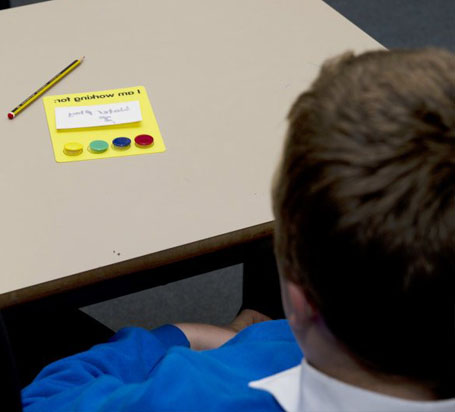Introduction

The Routes for Learning assessment materials were produced in Wales by a working group of teachers supported by researchers. They focus on early communication, social interaction and the cognitive skills that are crucial for all future learning.
The Routes for Learning pack (1)
Routes for Learning is a pack of informational and assessment materials aimed primarily at inexperienced teachers who require guidance on the teaching and assessment of pupils with PMLD.
The materials focus on the early communication, social interaction and cognitive skills that are crucial for all future learning, leading from very basic 'notices stimuli' to 'contingency awareness', 'object permanence', 'early problem solving', 'expresses preference for items not present via symbolic means' and 'initiates actions to achieve desired result', and look at the relationship between the pupils and their environment.
The Routes for Learning pack (2)

The pack contains an assessment booklet; a guidance booklet which provides an overview of the main theories and background information underpinning effective teaching and assessment; a DVD of videoclips taken in classrooms that demonstrate a range of early communication; and a CD with text files of all the printed documents.
The routemap

A 'routemap' (see the link above) shows a range of learning pathways leading to crucial skills. Crucial skills are shown as orange on the routemap but pupils will follow a range of pathways through it. The left-hand side of the routemap focuses on communication skills and the right-hand side on early cognitive development.
It is important to realise that there is no hierarchical or predetermined order to achievement of the steps in the routemap and that pupils may follow a range of pathways. Also, the routemap is not a curriculum for pupils with PMLD. However, the strength of the routemap lies in the possibilities of recording significant developments and suggesting possible next steps.

The routemap is not a mere checklist. For each of the milestones, there are clear criteria for objectively determining whether a pupil has achieved it.
For each numbered step on the routemap, the assessment booklet provides suggestions for assessment activities to try, things to look for in terms of changes in behaviour and teaching strategies that may help to move a pupil on to achieve the numbered step.
Study the assessment booklet, starting with pages 2 and 3.
Note: You may find it helpful to print off these two pages and lay them beside each other to view the spread as set out in the booklet. The numbers help you to relate the linked items across the four columns to the numbered steps in the routemap.

If you are supporting a less experienced teacher new to working with children and young people with PMLD, would you find Routes for Learning a good approach to the process of initially assessing early communication, social interaction and cognitive skills? Do you find that the routemap and the assessment booklet give you sufficient information? Are there any gaps?
How would you ensure that this inexperienced teacher was effectively and appropriately trained to deliver such assessments?